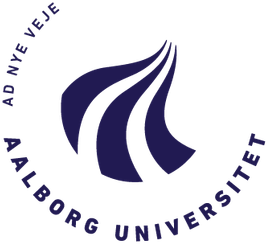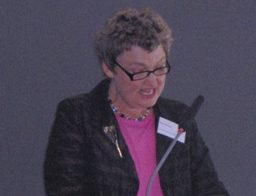
Cathrine Hasse (born 1956 in Denmark) is a professor of cultural anthropology and learning at the University of Aarhus, Denmark. Her research lies in the intersection between culture, learning and technology. [1]

Cathrine Hasse (born 1956 in Denmark) is a professor of cultural anthropology and learning at the University of Aarhus, Denmark. Her research lies in the intersection between culture, learning and technology. [1]
In 1994, Hasse graduated from anthropology from the University of Copenhagen, Denmark. Here, she was appointed a Ph.D.-scholarship in 1996.
From 2000 to 2001, she was affiliated with the National Research Center for the Humanities (Danmarks Humanistiske Forskningscenter) in Copenhagen. In 2002, she became an associate professor at the Department of Education, University of Aarhus, and in 2009 she became a professor MSO (“professor with special responsibilities”) at the Institute of Education and Pedagogy, also at the University of Aarhus, where Hasse since 2013 has led the research program Future Technologies, Culture and Learning located in Copenhagen.
Cathrine Hasse has also been affiliated with several universities as a research professor, incl. the University of Oxford, 2013, and at the Danish Institute for Science and Art in Rome, Italy, with regards to her interdisciplinary research of cultural dimensions in the natural sciences. Cathrine Hasse has led several international interdisciplinary research projects, incl. the EU-project Understanding Puzzles in the Gendered European Map (2005-2008), the Danish-Italian project The Cultural Dimensions of Science (2002-2005) and most recently the interdisciplinary technology project Technucation about technological literacy (2011-2015).
Furthermore, Hasse has written columns for the Danish daily newspaper Dagbladet Information and has also been a board member at the Department of Education, University of Aarhus (2000-2001), the Society of Gender Research (2000-2002) and of the Danish non-profit organization Oxfam IBIS (1990-1992). Since 2009, Hasse has been a member of the board of examiners for anthropology studies at the University of Copenhagen and, since 2012, a member of the board of examiners for techno-anthropology studies at Aalborg University. Since 2009, Cathrine Hasse has been a member of the research board at the Danish Confederation of Professional Associations (Academics) as well as of the research board at the Metropolitan University College, Denmark.
Higher education in Denmark is offered by a range of universities, university colleges, business academies and specialised institutions. The national higher education system is in accordance with the Bologna Process, with bachelor's degrees, master's degrees and doctoral degrees. The majority of higher education institutions are the responsibility of the Ministry of Higher Education and Science; however, some higher education institutions within the arts are the responsibility of the Ministry of Culture.

Aalborg University (AAU) is an international public university with campuses in Aalborg, Esbjerg, and Copenhagen, Denmark. Founded in 1974, the university awards bachelor's degrees, master's degrees, and PhD degrees in a wide variety of subjects within humanities, social sciences, information technology, design, engineering, exact sciences, and medicine. The university is also open to international students from the European Union (EU) or from countries from the Nordic Council or outside. The international students stemming from outside the European Union or the Nordic Council are subject to tuition fees.

Aarhus University is a public research university with its main campus located in Aarhus, Denmark. It is the second largest and second oldest university in Denmark. The university is part of the Coimbra Group, the Guild, and Utrecht Network of European universities and is a member of the European University Association.

1000Fryd is a small café, bar, and community center with a stage, a recording studio, a cinema, and an art gallery, located in Aalborg, Denmark. Since 1000Fryd opened in 1984 there have been thousands of concerts by both well known bands – such as Die Toten Hosen and Green Day – and utterly obscure local performers, such as Jimmy Justice and Columbian Neckties. It is a focus of the successful novel Nordkraft by Jakob Ejersbo.

Vincent Fella Rune Møller Hendricks is a Danish philosopher and logician. He holds a doctoral degree (PhD) and a habilitation (dr.phil) in philosophy and is Professor of Formal Philosophy and Director of the Center for Information and Bubble Studies (CIBS) at University of Copenhagen, Denmark. He was previously Professor of Formal Philosophy at Roskilde University, Denmark. He is member of IIP, the Institut International de Philosophie in Paris.
The Danish Communist Youth League is a Danish political organization for young communist activists. Founded in 1999, the DKU is the youth branch of the Arbejderpartiet Kommunisterne. Headquarters are located in Amager, with branch offices in Aarhus, Randers and Odense. As other citizen's associations, DKU receives financial funding from the Copenhagen Municipality.

Albert Gjedde: is a Danish-Canadian neuroscientist. He is Professor of Neurobiology and Pharmacology at the Faculty of Health Sciences and Center of Neuroscience at the University of Copenhagen. He is currently also Adjunct Professor of Neurology and Neurosurgery in the Department of Neurology, Montreal Neurological Institute, McGill University, Montreal, Quebec, Canada, Adjunct Professor of Radiology and Radiological Science in the Division of Nuclear Medicine, Department of Radiology and Radiological Science, Johns Hopkins University, Baltimore, Maryland, US, Adjunct Professor of Translational Neuropsychiatry Research, University of Southern Denmark, Odense, Denmark, and adjunct professor of psychiatry at Tabriz University of Medical Sciences, Tabriz, East Azerbadjan, Iran.

Margit Warburg is a Danish sociologist of religion. Since 2004, she has been professor of Sociology of Religion in the Department of Cross-Cultural and Regional Studies at the University of Copenhagen. She was an associate professor at the same university from 1979 to 2004.

Christoph Wulf is a German professor of Anthropology and Education at the Free University of Berlin.

Ole Fogh Kirkeby is a Danish philosopher and a professor at Copenhagen Business School in the Philosophy of Leadership.
The Rigmor and Carl Holst-Knudsen Award for Scientific Research is one of Denmark's oldest and most prestigious science prizes. It was established in 1956, on the birthday of Carl Holst-Knudsen, who was at that time the Chairman of the Board at Aarhus University. Originally worth 10 thousand Danish krones (DKK), it has grown to 100 thousand DKK in monetary value, and is awarded on 28 May annually. It is given without application "as a mark of respect", to a researcher who has produced one or more significant results which show promise in future research.
Peter Hervik is a Danish anthropologist and former professor in Media and Migration. He focuses on the media's representation and popular consciousness in the context of identities and everyday lives of ethnic minorities, immigrants and refugees in Denmark. while taking special interest in the historical evolvement of Danish neo-nationalism, neo-racism and populism
Jane Jin Kaisen is a visual artist and filmmaker based in Copenhagen, Denmark.

Cynthia M. Grund is an American philosopher and educator who as of August 2016 is Associate Professor of Philosophy at the University of Southern Denmark where she is also Research Director for The Aesthetics of Music and Sound project.
Kirsten Blinkenberg Hastrup is a Danish anthropologist and professor of anthropology at the University of Copenhagen. She has taken a special interest in the conjunction between the history and culture of both Iceland and Greenland, publishing widely on both, while also examining the relationship between the theatre and anthropology. Hastrup was president of the Royal Danish Academy of Sciences and Letters from 2008 to 2016.
Gunhild Moltesen Agger is a professor in Danish media history at Aalborg University. She conducts research in media science, focusing on Danish television drama and film, crime fiction and national identity in a globalized world.
Rubina Raja is a classical archaeologist educated at University of Copenhagen (Denmark), La Sapienza University (Rome) and University of Oxford (England). She is professor (chair) of classical archaeology at Aarhus University and centre director of the Danish National Research Foundation's Centre of Excellence for Urban Network Evolutions (UrbNet). She specialises in the cultural, social and religious archaeology and history of past societies. Research foci include urban development and network studies, architecture and urban planning, the materiality of religion as well as iconography from the Hellenistic to Early Medieval periods. Her publications include articles, edited volumes and monographs on historiography, ancient portraiture and urban archaeology as well as themes in the intersecting fields between humanities and natural sciences. Rubina Raja received her DPhil degree from the University of Oxford in 2005 with a thesis on urban development and regional identities in the eastern Roman provinces under the supervision of Professors R.R.R. Smith and Margareta Steinby. Thereafter, she held a post-doctoral position at Hamburg University, Germany, before she in 2007 moved to a second post-doctoral position at Aarhus University, Denmark. In 2011–2016, she was a member of the Young Academy of Denmark, where she was elected chairwoman in 2013.
Bente Halkier is a Danish sociologist and academic. Since 2016, she has been Professor in Sociology at the University of Copenhagen.

The Centre for Advanced Migration Studies (AMIS), is a research centre at the University of Copenhagen in Denmark. It engages in interdisciplinary research and postgraduate teaching concerning human migration. The centre is part of a growing trend in recognizing migration studies as a distinct field of academic research.
Eva Skafte Jensen is a Danish linguist and researcher at the Danish Language Council.